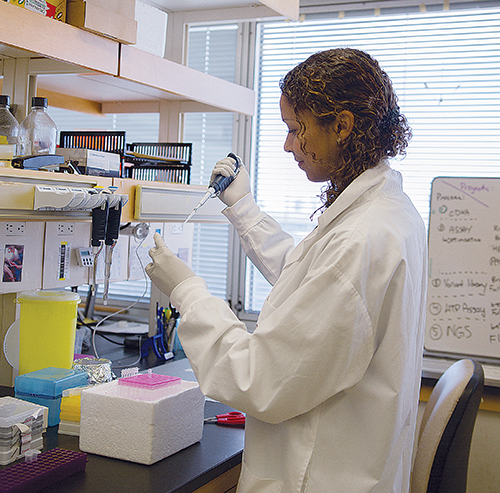January 1, 2017 (Vol. 37, No. 1)
Ranomics’ Functional Genomics Platform Can Classify Variants of Unknown Significance
Genetic testing results often include “known unknowns”—variants of unknown significance, or VUSs. Like puzzle pieces that don’t quite fit, VUSs stubbornly refuse to fill in disturbing gaps. Worse, they hint at alternative patterns, much to the frustration of clinicians, who order genetic tests not to heighten uncertainty, but to lessen it.
To help resolve VUSs in genetic testing results, a Toronto-based startup called Ranomics is conducting functional studies to identify the effects of various mutations on cancer genes using disease models in human cell lines as well as model organisms. “We’re the only company in the market conducting this type of high-throughput functional study and providing a comprehensive database to help companies and laboratories understand what previously unclassified variants mean in terms of clinical relevance,” says Ranomics CEO and co-founder Cathy Tie.
“Up to 60% of genetic tests in the $10 billion genetic testing market are inconclusive because of VUSs found in patient genomes,” Tie tells GEN. When tests are inconclusive, physicians are more likely to misdiagnose their patients’ conditions.
Genetic testing can be more definitive if it incorporates Ranomics’ technology, which enables clinical laboratories to access functional experimental data. With this information, clinical laboratories can determine whether previously unclassified mutations should be considered pathogenic or benign. Ultimately, such findings allow physicians and their patients to make better, more informed decisions.

Sofia Oke, laboratory manager at Ranomics, performs a functional assay, the results of which will be carried through the company’s patented multisite saturation mutagenesis pipeline, which processes experimental and statistical information to compile a gene variant library.
How It Works
“We provide functional data from wet lab assays for every possible single point mutation in a gene or given gene domain,” Tie asserts. That includes variants that are clinically classified as well as those not yet clinically classified.
“We compare the clinical data for known variants to the functional data to learn whether the known pathogenic and known benign variants in the clinical space match the results of our functional studies,” she explains, adding that the degree to which they match indicates the accuracy of the assay. “That’s also how we can confidently report the classifications of the variants that previously were unclassified.”
This approach is more accurate than predictive software algorithms and faster than family tree testing. Each dataset comes with a variant report that includes a functional score for the variant and its pathogenic/benign classification.
Ranomics concentrates on genes implicated in breast, ovarian, prostate, and colon cancer. It provides more than 14,000 combination assessments at more than 94% accuracy. The company’s first database includes 2,000 VUSs for the BRCA1 gene, which is linked to breast cancer. Ranomics is expanding its work to include BRCA2, CHEK2, and CDK4 genes.
“These genes,” notes Tie, “are commonly analyzed in typical hereditary cancer genetic testing panels.”
Market Access
Ranomics’ database can be accessed either of two ways. “Genetic testing companies and laboratories can access our database through our cloud-based Internet platform by registering with us and querying variants,” states Tie. This access is available on an annual subscription basis. Alternatively, companies with higher testing volumes can license the platform, putting the database on their own servers through an annual licensing agreement.
Genetic testing companies and clinical laboratories are the primary target markets. “These are customers that perform testing for hereditary cancer genes and encounter VUSs on a daily basis in patients’ genomes,” details Tie. Variant interpretation software companies are another important market segment. “Our data is very valuable to them because it provides another layer of information,” she elaborates. “Sometimes ours is the first data to be available for VUSs.”
Growth Plans
Ranomics was founded in January 2015 by Tie and Leo Wan, a Ph.D. candidate at the University of Toronto. “I was working at the University of Toronto laboratory of molecular geneticist Dr. Frederick Roth,” Tie recalls. “Research involving functional studies inspired me to learn more about the genetic testing industry and to apply this technology to solve a large problem in that industry. Wan had experience with similar technology.”
About one month after Tie and Wan formed Ranomics, the company received $100,000 in incubator funding from IndieBio in San Francisco. Ranomics moved to Johnson & Johnson Innovation’s JLABS @ Toronto, a life sciences incubator, in August 2016.
In the two years since its inception, Ranomics has partnered with several firms including Castle Medical and Veritas Genetics, as well as Interactive Biosoftware, a French genetic annotations company that will provide the Ranomics database to more than 350 clinical laboratories worldwide. Other leading genetic organizations that have subscribed to the Ranomics database include the Beijing Genetics Institute, the London Health Network, and the Advanced Molecular Diagnostics Laboratory at Toronto’s Mount Sinai Hospital.
Ranomics recently raised $1.2 million to advance R&D and business development. The goals, according to Tie, are to “scale our technology to understand more cancer genes and to generate data on variants for more recently discovered cancer genes such as BRCA2, CDK4, and CHEK2, as well as other genes in common cancer panels.”
“Our plan,” Tie continues, “is to generate a full variant dataset through functional studies and to incorporate it into a comprehensive database for our customers in clinical laboratories throughout the world.” From a technological perspective, fulfilling this plan requires functional studies covering potentially hundreds of thousands of mutations in genes that are implicated in cancer.
The company’s long-term objective is to interpret genetic variant information for every gene linked to human disease. “Our ultimate goal,” Tie insists, “is to have a positive impact on cancer research and care by enabling more accurate and conclusive tests.”
Ranomics



